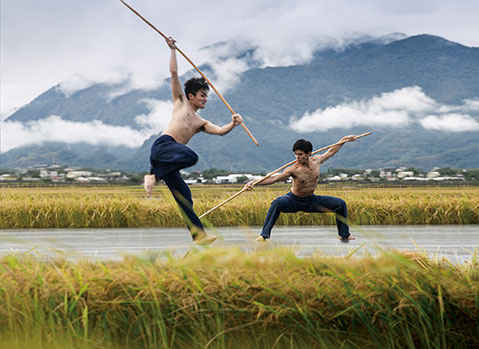Cloud Gate Dance Theatre of Taiwan
UCSB Arts & Lectures Brings ‘Rice’ to the Granada

When Lin Hwai-min began Cloud Gate Dance Theatre back in 1973, Taiwan had no other professional dance companies, and the art of choreography, especially for modern and contemporary dance, commanded little respect. “When I started, my family and friends were surprised,” he told me last week by phone from his hotel in San Francisco, another stop on Cloud Gate’s current North American tour. “There was no path to follow, and little support, so I had to figure it out for myself. I had to take care of the sets and the costumes, and I even had to train the techs who ran the light and the sound.”
Today, more than 40 years later, things could hardly be more different. Cloud Gate is the pride of high-tech Taiwan, both one of its most prestigious cultural exports and the focus of a massive home fan base that routinely packs outdoor shows in Taipei with upward of 60,000 spectators. Honored multiple times as one of the world’s top choreographers, Hwai-min remains refreshingly approachable and present to interviewers and audiences, and his wit sparkles whether he’s speaking Chinese or English. His company, with its athletic and spirited dancers, imaginative and technically innovative staging, and unexpected combinations of music and subject matter (rice farming and Maria Callas?) is one of the most in-demand dance groups on the international circuit, stopping at all the best venues from Hong Kong to Moscow, Paris, London, and beyond.
The work that Cloud Gate will perform as part of the UCSB Arts & Lectures Dance series at the Granada on Tuesday, February 2, is called Rice, and it does use the vocalizing of opera great Maria Callas, alongside traditional Taiwanese folk songs in the indigenous Hakka language. In order to research and design this intricate, seamless 75-minute spectacle, Hwai-min deployed a team of specialists, including videographer Howell Hao-jan Chang, who shot stunning time-lapse footage of every aspect of rice cultivation in the village of Chihshang in the East Rift Valley of Taiwan. Ethan Wang then turned that footage into the wall-to-wall back projection that seems to immerse the dancers in a living landscape.
Yet for Hwai-min, just capturing the images of his subject matter on video was nowhere near enough. In order to adequately prepare his dancers, he decided that it would be necessary for them to travel to the site and participate in the harvesting of the rice. This way, they would be able to enter more fully into the elemental sensations of the seasonal cycle when they set out to portray it onstage. Asked if the dancers were surprised by his request, Hwai-min laughed, saying, “Nothing I do surprises them anymore — they know I am crazy.”
Crazy or not, Hwai-min could hardly be more influential, not only in the contemporary dance world but also in the broader culture of what has been called “the three Chinas” — the People’s Republic of China, Hong Kong, and Taiwan. An esteemed novelist as well as one of the first public figures in Taiwanese life to come out as a gay man, Hwai-min has, by sheer force of personality and tremendous organizational effort, altered the perception of contemporary dance as an art form in East Asia. On Tuesday, Santa Barbara gets its chance to see how his crops grow.
4.1.1
UCSB Arts & Lectures presents Cloud Gate Dance Theatre of Taiwan in Rice on Tuesday, February 2, at 8 p.m. at the Granada Theatre. For tickets and information, visit artsandlectures.sa.ucsb.edu or call 893-3535.



